
In 2003, I stumbled into a life-changing experience. I got to help start a school inside an incredible ad agency, Wieden+Kennedy.
Before I started working at the agency I worked in education for 3 1/2 years. I had a rough idea of how schools operate and I’d done a little teaching but I didn’t have any idea how to start school. The most important thing I learned at WK 12 is that anything is possible. It’s really about motivation, time, and belief.
The next most important thing I learned was how to get a stable job.
How to get a stable job: 5 lessons from my WK 12 experience
What is the meaning of job security?
My experience with Wieden+Kennedy 12
These 5 lessons are my secret to job security.
What is the meaning of job security?
Everyone wants to feel secure in their employment. When a single job determines your ability to pay your bills and support yourself and maybe your family too, you want to know that you’re not at risk. Many people think that the secret to job security is to find the right kind of work. That is part of it, but limiting your career search to stability alone can be a path to boredom and dissatisfaction.
I know from experience that it’s possible to take risks and follow your creative dreams while also finding and maintaining job security.
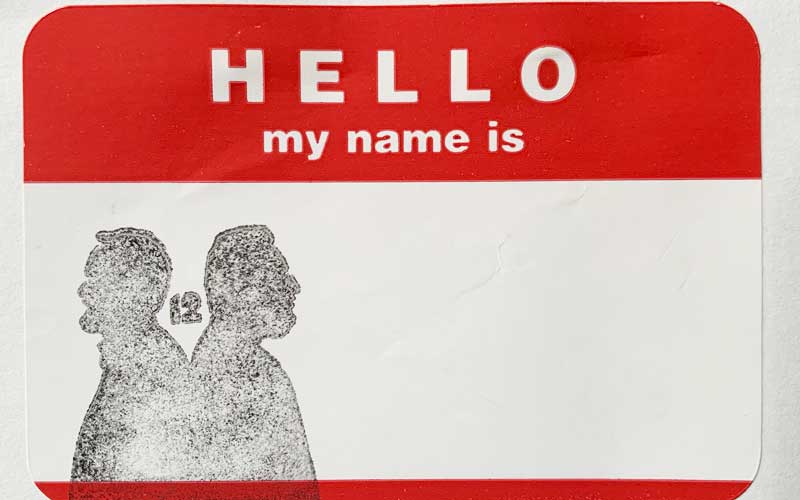
My experience with Wieden+Kennedy 12
I’ve always been a hard worker. I ordered the muffins for the first interest meeting for WK 12. I drove with colleagues to Salem to get the school licensed. I wrote first drafts of admission and scholarship letters and created academic policies. I learned how ad agencies work and what different departments do. I reconciled budgets, managed client projects, and kept detailed records of everything.

I’d never worked in an environment so challenging and inspiring. I was desperate to succeed and often got in my own way. I could spend hours talking about this experience, and will probably write about it again, but in this post, I want to share some of the lessons that have had a lasting impact.
These 5 lessons are my secret to job security.
1. Time management and Covey
I was 25 or 26 when I started working at WK 12 and a combination of cocky and innocent. I hadn’t worked in enough offices to understand how to balance work and life and still get the results I wanted. I had some weird ideas that I was very stuck on, and it was getting me into trouble.
Then Jelly introduced me to Stephen Covey’s 7 Habits of Highly Effective People. I didn’t read it straight through, not for a year or so. But Jelly shared a single chapter that has stuck with me. It’s an old standard for some people, but I’ve met a lot of people who could benefit from it. It’s the Time Management Matrix.
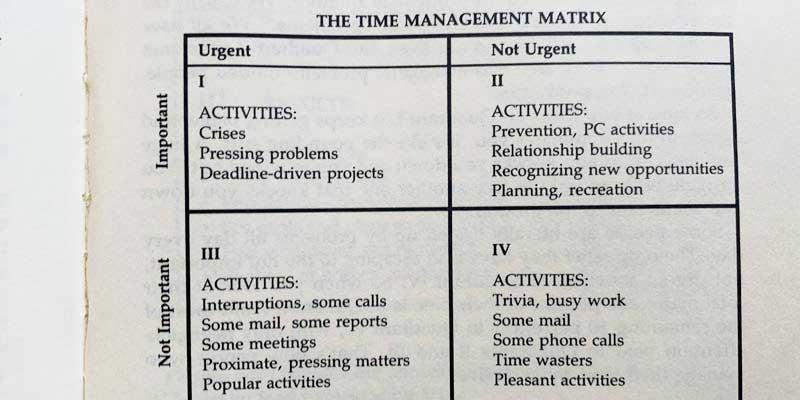
This matrix makes it simple to divide your day and to prioritize what you do. It gives you time to react to issues but also time to look at the big picture. It can help you make changes that will minimize the amount of time you have to spend reacting. Managing your time this way is a much more interesting way to work and it’s also very empowering. The best way to make yourself essential in any role is to anticipate and solve problems before they become a real problem. This matrix gives you the time to do that.
If you step back from this matrix it seems obvious, without this framework it’s easy to spend most of every work day reacting to what your boss wants or customer complaints. Challenges like this exist in every job, even if you own the business!
Another concept from the book that’s helped me personally and professionally is in the next lesson.
2. Circle of Concern and Circle of Influence
Covey’s book has been around a while and there are many interpretations of this principle out in the world. The way I think about it ties directly to my ability to be reactive or proactive in a situation.
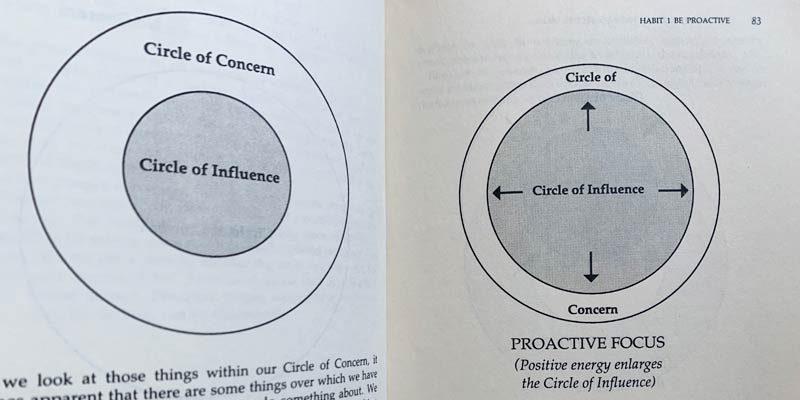
The Circle of Concern includes all the things that I care about and are important to me. These include political and social justice issues, how things are at work, how things are with my family who live all over. My Circle of Concern includes anything that touches my world. Many people focus their energy on the Circle of Concern, and spend a lot of time reacting to individuals or circumstances they can’t control. The Circle of Concern is important, but really exhausting.
The Circle of Influence includes what I can change or control with my behavior. I can’t change how other people act or think, so this principle reminds me to focus on what I can influence. I’m not talking about convincing someone else to do something, I’m talking about proactively working on what I can change with my own actions. It is really helpful when I’m trying to figure out what to prioritize on any given day.
Someone who has mastery of the Circle of Influence can, over time, affect the behavior of the people around them. Working proactively can make you more stable in any position. I talk more about this in lesson five.
3. Top five
Jelly asked “What is your top 5?” on a regular basis throughout WK 12. This exercise is a simple way to crystallize any experience. It gives you another path to job stability because it helps you notice trends and habits before they have a negative impact. The Top five exercise is also an incredibly effective problem solving tool.
The next time you’re taking a class, sitting in a meeting, or trying something new, list your top five.
Your top five may be something someone said. It could be something visual that struck you or a specific moment or how you felt. I used this technique all through graduate school, then forgot about it for a few years. But when I took a mindfulness-based meditation class in 2013, I found that I needed a simple way to pull together the changes I was noticing in myself over the course of the class. Top five was a lifesaver.
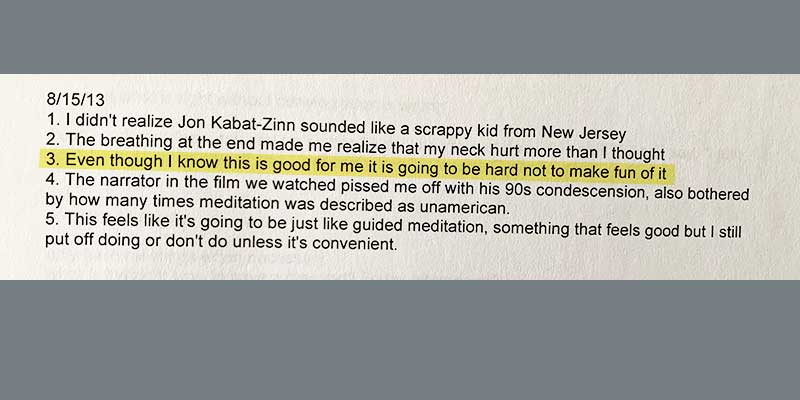
As I was writing this I spent a lot of time trying to find the right example and came up empty. I think an example will limit you and what you can do with this exercise needlessly. So if you’re looking for more instructions, try this:
- Take a walk
- Get out your phone or pen and paper
- Write down your top five
4. Improv
Improv was an important foundation for WK 12. It’s also an effective tool if you’re looking for job security. Let me explain. The center premise of improv is saying “Yes, and…” Tina Fey does a great job explaining how this works in her book Bossypants.
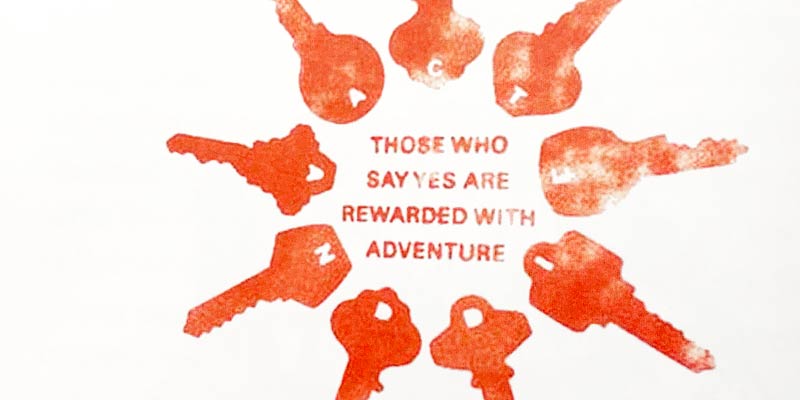
There were two phrases that were a big part of the WK 12 philosophy:
- Those who say no are rewarded with safety
- Those who say yes are rewarded with adventure
I don’t know about you, but my gut instinct is to say no to suggestions or last-minute requests because I’m always busy and have a full plate of priorities. But whenever I start a new job or am getting to know a new group of people, I say yes early and often.
I know that every time I say yes something interesting happens. It might be that I learn something useful or I meet someone interesting. It could be volunteering to solve a problem outside of my job description or joining a team that’s talking about a new project or initiative.
Saying yes can be exhausting for me. It is often uncomfortable. As someone who grew up feeling like the world is a dangerous place, I cherish feeling safe and in control. Saying yes can feel wrong to me sometimes. I also recognize that most of the joy I’ve experienced has involved saying yes.
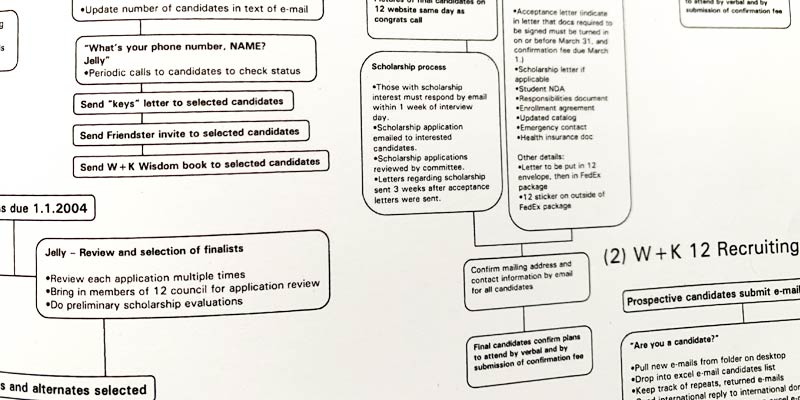
5. Anticipate
I used to fly cross-country a few times a year. Airports are great for people watching, and my favorite pastime before cell phones was watching couples at airports. There’s no place like an airport to see how people really treat each other, and to think about how you want to treat the people in your life. The couples I still think about the most are the ones that anticipate each other.
In my role at WK 12, in addition to running the school, I was Jelly Helm’s executive assistant. I’ve worked alongside many incredible executive assistants and I got to learn from them in this role. The best executive assistants are mind readers, sages, and professional parents. They are the people behind the scenes that get things done.

I know that no one can really read minds. It’s not really possible to know what someone is thinking before they think it. But what I learned is that, with some work and careful attention, you can anticipate the needs of just about anyone, and that ability can be your path to job security.
My secret to anticipation was a document Jelly shared with me. It was a letter from another leader he admired sharing what he wanted in an executive assistant. The first time I read this letter I felt defeated. I had no idea how to do anything on the list.
So, I broke it into pieces. I went through the letter line by line. For each sentence I wrote out a list of questions. Next, I found the people who I thought would be the best to answer those questions. Then I sat with every executive assistant who could make time for me and talked to them about what they did and how they did it. I asked what they liked and didn’t like, what was hard for them and what was easy. I learned who I needed to be to succeed in that role. In the process I developed a strategy to accomplish just about anything. I’ve added the outline to my blog so I don’t forget. 🙂

A personal note
I want to add that this final lesson isn’t for everyone. It took some time for me to recognize that I am great just as I am and I don’t need to force myself to be someone I’m not to succeed. But that realization took a while for me.
I also know that pushing my boundaries this way was an important learning experience that has opened the doors to a lot of opportunities. You can read more about how I found the right path in this article about changing careers.
